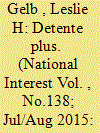| Srl | Item |
| 1 |
ID:
175628


|
|
|
|
|
| Summary/Abstract |
Scholars have long seen the Harmel Report as a significant moment in NATO’s history as the Western allies staked out a role for the Alliance in the pursuit of détente. This article examines how and why the Harmel Report’s parallel formula of defence and dialogue endured, focusing on the Alliance’s 1984 reappraisal of East-West relations, the Tindemans Initiative. A snapshot of the Alliance’s ongoing conversation about détente, the Tindemans Initiative illustrated the degree to which détente remained contested, yet also the enduring value of the Harmel Report’s ‘double philosophy’ as a mechanism to retain sufficient public support for the Alliance.
|
|
|
|
|
|
|
|
|
|
|
|
|
|
|
|
| 2 |
ID:
138995


|
|
|
|
|
| Summary/Abstract |
With the Cold War’s demise, the menacing Russia that long loomed over Europe seemed to vanish. The Russia of 1992 was just a fragment of its historic self in military punch and economic weight. Not even Russia’s still-formidable nuclear arsenal deflected perceptions of decline. It was inevitable, then, that Western policy makers would feel that this shrunken Russia was more to be ignored than feared. They were wrong.
|
|
|
|
|
|
|
|
|
|
|
|
|
|
|
|
| 3 |
ID:
149734


|
|
|
|
|
| Summary/Abstract |
THE PROCESS of international detente in the latter half of the twentieth century, which included such important events as the signing of the Final Act of the Conference on Security and Co-operation in Europe (CSCE), the establishment of political and economic relations between some Western and Eastern countries, and negotiations on disarmament and nuclear security, largely determined the further course of world history. The French Republic was among the major actors participating in the aforementioned events. A new monograph by EA. Osipov, France and the Evolution of Detente (1965-1975), focuses on France's role in the process of easing international tensions.
|
|
|
|
|
|
|
|
|
|
|
|
|
|
|
|
| 4 |
ID:
167950


|
|
|
|
|
| Summary/Abstract |
The years 2017–2019 have been remarkable in the long stand-off with North Korea,
as much for the drama of war-threats and then summits, as for the durability of the
North Korean status quo. Indeed, given all the sturm-und-drang of both hawkish
and then dovish approaches to North Korea since 2017, the greatest surprise is how
little both alternatives have accomplished ‘on the ground.’ This essay investigates
surprise—why is the North Korean status quo so persistent? Specifically, why
have the hawkish and dovish deviations from the status quo since 2017 so failed
to change much? Several hypotheses derived from levels of analysis theory in
international relations are suggested. In brief, a leader level analysis would focus
particularly on Trump’s personality—his swings of interest, his personalistic
bargaining style, his sloth, his chaotic staffing. A domestic analysis would identify
the divisions within both the United States and South Korea over policy toward
the North. And a structural answer would posit the value of nuclear deterrence
as the cause particularly of Trump’s failure to budge Pyongyang. Because North
Korean intentions, particularly Kim’s psychological preferences, are only poorly
discernible, assigning causal weight to each hypothesis is quite difficult so long as
the North’s opacity persists. Hence this essay focuses on concept and hypothesis
development while nonetheless laying out what evidence there is.
|
|
|
|
|
|
|
|
|
|
|
|
|
|
|
|